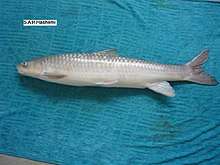Shabout
| Shabout | |
|---|---|
 | |
| Scientific classification | |
| Kingdom: | Animalia |
| Phylum: | Chordata |
| Class: | Actinopterygii |
| Order: | Cypriniformes |
| Family: | Cyprinidae |
| Subfamily: | Cyprininae |
| Genus: | Arabibarbus |
| Species: | A. grypus |
| Binomial name | |
| Arabibarbus grypus | |
| Synonyms | |
| |
The shabout (Arabibarbus grypus) is a species of Cyprinid fish called in English, Persian or Arabic by the alternate common names shirbot and variations shabut, shabboot or shabbout, and in local languages by several other common names. It is a large freshwater carp found in the Tigris-Euphrates Basin, as well as southern Iran.[3] It is a commercially fished species in this region. This species can grow to a length of nearly 2 metres (6 ft 7 in) and a weight of over 50 kg (110 lb).
The shabout has recently been in the news [4] when it was proposed that this "shabut" was identical to the fish called in the Talmud shibuta (שיבוטא). The latter's brain is famous for being touted as the kosher equivalent, taste-wise, of the otherwise forbidden and even taboo pork meat (cf. Chullin 109b). However, names of species are notorious for changing over time and between related languages, a fact, incidentally, the Talmud itself attests. The fact that Arabibarbus grypus is called in Modern Hebrew Shibuta is no proof that it is the same fish as the Talmudic one, as Modern Hebrew has a strong tendency to assimilate local Arabic names for such realia.
The shabout is an important target species for commercial fisheries which has been heavily overfished in some parts of its range for many years. In addition, it dams have blocked its migration routes and its habitat has been further degraded by water abstraction and pollution. In Iraq the population had declined by 90% between the 1960s and the 200os, although data from other parts of its range is not available. Its preferred habitat is medium to large rivers with a moderate flow but for spawning it requires a faster current over gravel or among vegetation. It does occur in reservoirs but needs to migrate upstream to spawn.[1]
The fish is also being considered for aquaculture. Many species of carp are farmed as a protein source already.
References
- 1 2 J. Freyhof (2014). "Barbus grypus". The IUCN Red List of Threatened Species. e.T19171241A19223133. doi:10.2305/IUCN.UK.2014-1.RLTS.T19171241A19223133.en.
- ↑ Borkenhagen, K. (2014): A new genus and species of cyprinid fish (Actinopterygii, Cyprinidae) from the Arabian Peninsula, and its phylogenetic and zoogeographic affinities. Environmental Biology of Fishes, 97: 1179–1195.
- ↑ Froese, Rainer and Pauly, Daniel, eds. (2017). "Arabibarbus grypus" in FishBase. April 2017 version.
- ↑ "At Kosher Feast, Fried Locusts for Dessert –". Forward.com. Retrieved 2012-04-20.
